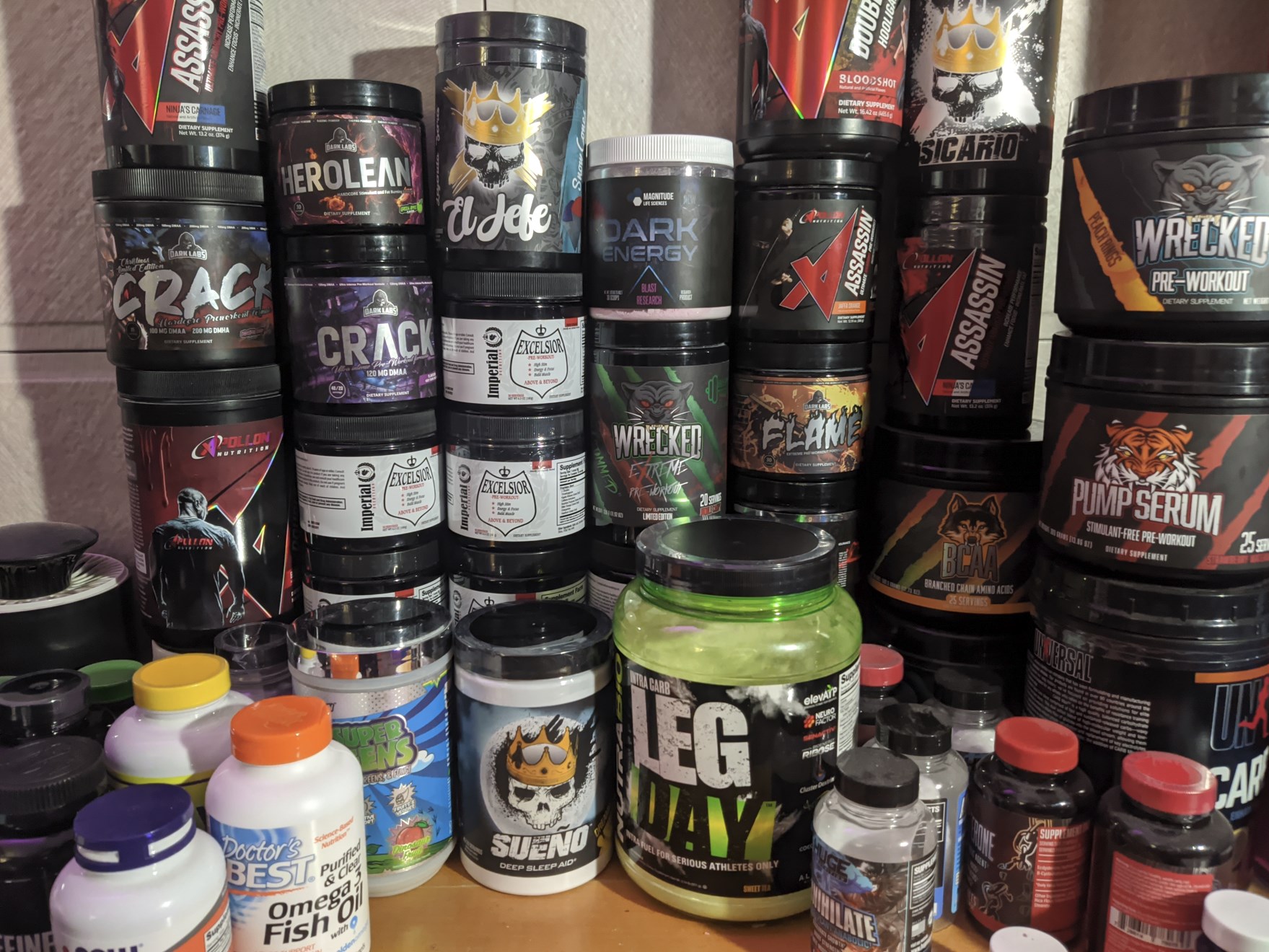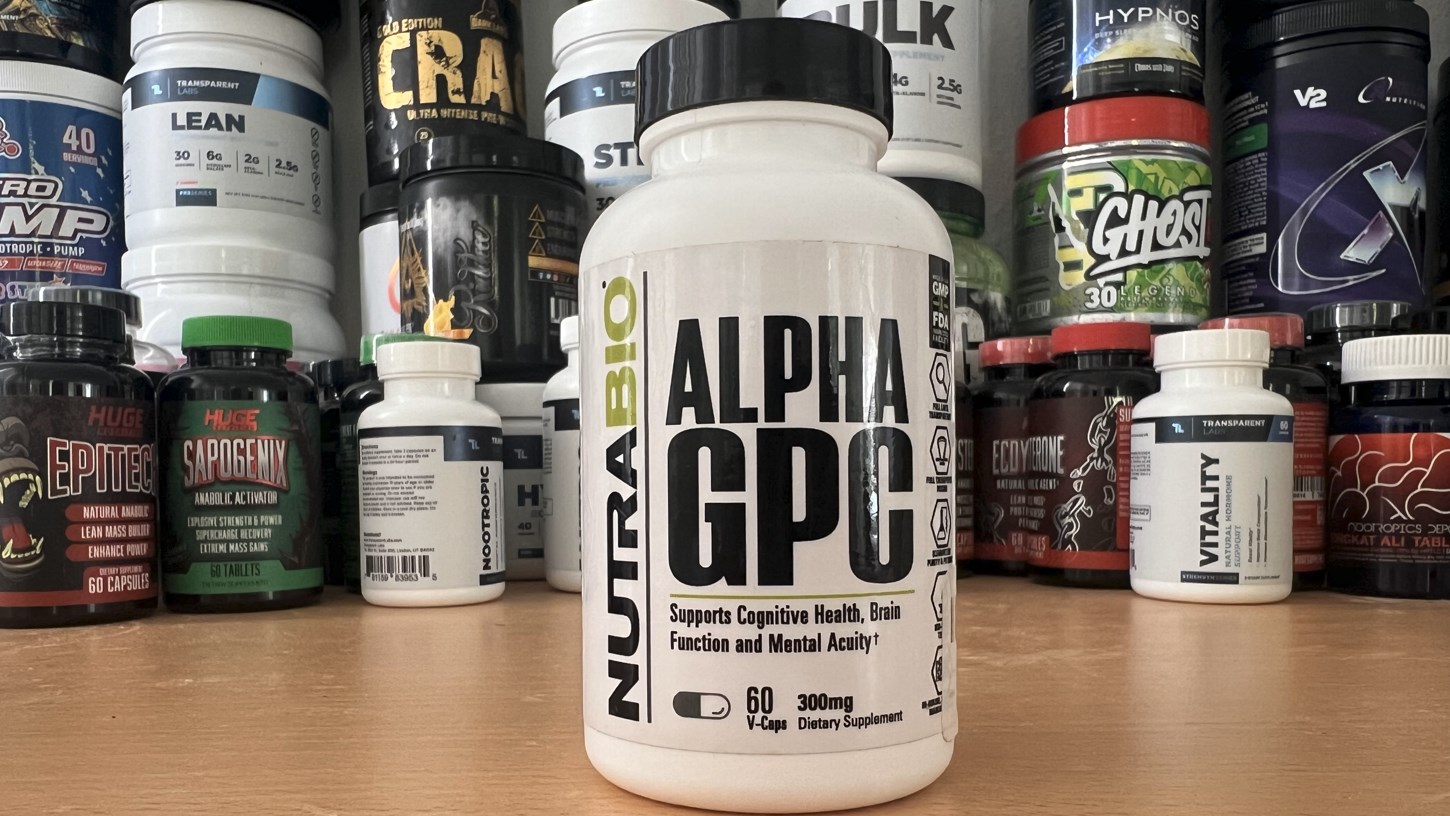
Ever wonder why some gym sessions feel unbeatable? The secret might be in their pre-workout.
Packed with ingredients to supercharge energy, focus, and endurance, choosing the right pre-workout can transform your workouts.
But in a sea of options, finding your perfect match is key. Ready to find out how?

Here we'll explain pre-workouts and what you should use them for...
A pre-workout is a supplement typically consumed before exercise to enhance physical performance and energy.
They come in various forms, including powders, pills, and ready-to-drink beverages, and contain a blend of ingredients designed to increase energy, endurance, strength, and focus.
Read: What is pre-workout?
The main goal of a pre-workout supplement is to prepare your body for the workout ahead.
It's like a warm-up for your muscles, giving them the fuel to perform at their best.
Whether you're lifting weights, running, or participating in high-intensity interval training, a pre workout can provide the boost you need to push harder and achieve your fitness goals.
Suggested reading: What's the purpose of pre-workout?
These ingredients are great to have in a pre-workout...
Caffeine is a staple in many preworkout supplements and for a good reason.
It's a powerful stimulant that can help increase alertness and delay fatigue.
Research shows caffeine can enhance aerobic and anaerobic exercise, making it a versatile ingredient for any workout.
The clinical dosage for caffeine in a pre-workout is typically between 150 to 300mg.
L-Citrulline is an amino acid that plays a crucial role in producing nitric oxide, a molecule that helps relax and widen blood vessels.
This process can improve blood flow to your muscles, enhancing oxygen and nutrient delivery.
One study shows that L-Citrulline can improve power output in weightlifters, making it a valuable addition to your workout.
The clinical dosage for L-Citrulline is around 6 to 8 grams.
Beta-Alanine is another amino acid commonly found in pre workout supplements.
It helps produce carnosine, a molecule that helps buffer acid in muscles, leading to improved muscular endurance.
Research proves that Beta-Alanine can enhance performance during high-intensity exercise.
The clinical dosage for Beta-Alanine is around 2 to 5 grams.
Alpha-GPC is a compound that can help boost cognitive function, improving focus and mental clarity during workouts.
This study shows that Alpha-GPC supplementation can increase power output in athletes, making it a key ingredient for those looking to enhance both physical and mental performance.
The clinical dosage for Alpha-GPC is around 300 to 600mg.
Betaine Anhydrous is a compound derived from the amino acid choline.
It's been shown to improve strength, power, and muscle endurance, making it a popular addition to pre-workout supplements.
Research shows that Betaine supplementation can enhance muscle endurance and increase strength.
The clinical dosage for Betaine Anhydrous is around 2.5 grams.
Agmatine is a compound produced by the amino acid arginine.
It's been shown to enhance nitric oxide production, improving blood flow and nutrient delivery to muscles. This can lead to better performance and improved muscle pumps during workouts.
This study shows that Agmatine supplementation can enhance muscle pumps and improve nutrient partitioning, making it a valuable addition to any pre workout.
The clinical dosage for Agmatine is around 500 to 1000mg.
Here are some ingredients that are in patented forms...
Infinergy® is a patented form of caffeine known as dicaffeine malate.
It combines caffeine and malic acid to provide a smooth energy boost without the crash often associated with caffeine.
This makes it a popular pre-workout choice, providing sustained energy throughout your workout.
AlphaSize is a patented version of Alpha-GPC, a nootropic that enhances cognitive function.
It's considered a top-tier nootropic due to its high bioavailability, meaning it's easily absorbed and utilized by the body.
This makes it an excellent choice for improving focus during workouts.
Find the best nootropic pre-workouts here.

The decision to take a pre-workout supplement is highly personal and depends on your individual fitness goals, workout intensity, and overall health. Here's a breakdown of the key points to consider:
Benefits of Pre-Workout Supplements:
Energy Boost: Pre-workout supplements can provide a significant boost in energy, helping you push through tough workouts.
Improved Performance: Many pre-workouts contain ingredients designed to enhance physical performance, allowing you to get the most out of your training sessions.
Enhanced Focus and Motivation: Certain ingredients in pre-workouts can improve mental focus and motivation during your workouts.
Things to Remember:
Not a Magic Bullet: Pre-workouts are not a replacement for a balanced diet, adequate hydration, and regular exercise.
Individual Responses Vary: Everyone's body responds differently to these supplements. Some people may experience significant benefits, while others may find the effects minimal.
Potential Side Effects: Some people may experience side effects such as jitteriness, upset stomach, or difficulty sleeping, particularly if the supplement contains high levels of caffeine.
Before You Start:
Do Your Research: Choose a product that is safe, effective, and aligns with your fitness goals. Look for products with transparent labels, effective dosages, and ingredients that are backed by scientific research.
Consult a Healthcare Provider: It's recommended to consult with a healthcare provider or a nutritionist before starting any new supplement regimen, especially if you have any underlying health conditions or are taking other medications.
Listen to Your Body: Start with a lower dose to assess your tolerance and adjust as needed. If you experience any adverse effects, discontinue use and seek medical advice.
For more detailed information on the safety of pre-workout supplements, you can read here.
When it comes to pre-workout supplements, the brand you choose can make a significant difference.
Different brands have different formulations, ingredient quality, and pricing.
To help you navigate this landscape, we've compared some popular brands:
Ryse and Bucked Up are two popular brands in the pre-workout market.
Both offer a range of pre-workout supplements designed to boost your workout performance. But how do you choose between them?
Our Ryse vs. Bucked Up comparison breaks down the key differences between these two brands.
We look at factors like ingredient quality, formulation, pricing, and customer reviews to help you make an informed decision.
Remember, the best brand for you will depend on your specific needs and preferences.
So, consider what's most important to you in a pre-workout supplement - is it the ingredient quality, the price, or the brand reputation?
If you're considering Huge Supplements or Crazy Bulk, it's important to understand how these two compare, as you'll learn what to look for when comparing brands.
Our Huge Supplements vs. Crazy Bulk comparison provides a detailed breakdown of these two brands.
We compare their product range, ingredient quality, pricing, and customer feedback to help you decide which brand best fits you.
Again, the best brand for you will depend on your individual needs and preferences.
So, take the time to consider what you value most in a pre-workout supplement - is it the range of products, the quality of ingredients, or the price?
By understanding how different brands compare, you can make a more informed decision when choosing a pre-workout supplement.
Remember, the best pre-workout for you is the one that aligns with your fitness goals, dietary restrictions, and personal preferences.
So, do your research and choose wisely.
While there are many beneficial ingredients to look for in a pre-workout supplement, there are also some that you should avoid.
These ingredients may have side effects or be ineffective.
Here are some of the ingredients to be cautious of:
Yohimbe is often included in pre-workout supplements for its supposed fat-burning properties.
However, it can lead to side effects, including rapid heart rate, high blood pressure, and anxiety.
Research has shown that the risks associated with Yohimbe far outweigh its potential benefits.
DMAA is a popular stimulant in pre-workout supplements because it increases energy and focus.
However, it has been linked to serious side effects such as heart attacks and strokes.
The FDA has issued warnings against its use, which is now banned in many countries.
Read: Is DMAA Legal?
Proprietary blends are mixtures of various ingredients that supplement companies claim to have a unique, effective formula.
The problem with these blends is that they do not disclose the amount of each ingredient, making it impossible to know if you are getting an effective dose.
It also makes it difficult to identify potential allergens or ingredients you may be sensitive to.
While caffeine can be a beneficial ingredient in a pre-workout supplement, too much can lead to side effects such as jitters, insomnia, and increased heart rate.
According to the FDA, up to 400mg of caffeine daily appears safe for most healthy adults.
However, individual tolerance can vary, and it's important to consider all sources of caffeine in your diet.
Find our lists sorted by caffeine dosage here.
Many pre-workout supplements contain artificial sweeteners and colors to enhance their taste and appearance.
However, some people may have sensitivities or allergies to these additives.
Additionally, some research suggests that certain artificial sweeteners may adversely affect gut health.
Remember, reading the label of any supplement you're considering is always important.
If you're unsure about an ingredient, research or consult a healthcare professional.
Your health and safety should always be the top priority.
See best pre-workouts without artificial sweeteners.
DMHA (Dimethylhexylamine) is a stimulant often found in pre-workout supplements.
It is known for its ability to increase energy, focus, and euphoria.
However, it's not without its risks.
DMHA is structurally similar to other stimulants such as DMAA, which the FDA has banned due to serious health risks, including heart attack and stroke [source].
DMHA can cause a rapid increase in blood pressure, which can be dangerous for individuals with pre-existing heart conditions.
It can also lead to shortness of breath, chest pain, and rapid heartbeat.
Furthermore, the long-term effects of DMHA are not well-studied, and it's unclear what impact chronic use may have on the body.
It's also worth noting that DMHA is currently on the World Anti-Doping Agency's list of prohibited substances, making it a no-go for competitive athletes [source].
Synephrine is another common ingredient in pre-workout supplements.
It's a natural compound found in certain types of citrus fruits, and it's often used for its potential to increase fat burning and enhance physical performance.
However, like DMHA, synephrine comes with its own set of risks.
Synephrine can increase heart rate and blood pressure, which can be dangerous for individuals with heart conditions.
It can also cause headaches, migraines, and feelings of nervousness or anxiety.
In rare cases, it can lead to more serious side effects like fainting, heart attack, and stroke [source].
Moreover, the safety of synephrine is still under debate.
Some studies suggest it's safe when taken in moderate doses, while others have linked it to adverse cardiovascular events.
It's also worth noting that synephrine is banned by the NCAA (National Collegiate Athletic Association), indicating its potential for abuse [source].
Pre-workouts have various benefits; let's dig into them...
One of the primary benefits of pre-workout supplements is their ability to enhance power and strength.
Ingredients like caffeine and Alpha-GPC have been shown to improve power output, helping you lift heavier weights and perform more reps.
Pre workouts can also help delay fatigue, allowing you to work out for longer periods.
This is particularly beneficial during high-intensity workouts, where fatigue can occur quickly.
With ingredients like Alpha-GPC, pre-workouts can help improve focus and mental clarity, allowing you to stay dialed in during your workouts.

Like anything else, caffeine should be used in moderation.
Here are the dosages you should be using and avoiding...
Caffeine is a powerful stimulant that can significantly enhance workout performance.
The safe dosage of caffeine varies depending on individual tolerance, but generally, a dose of 150 to 300mg is considered safe and effective for most people.
This amount is typically enough to boost energy, focus, and endurance without causing unwanted side effects.
When the dosage of caffeine starts to climb above 300mg, it can become risky for some individuals.
High doses of caffeine can lead to side effects such as jitters, increased heart rate, and upset stomach.
It's also worth noting that everyone's tolerance to caffeine is different.
What might be a moderate dose for one person could be a high, risky dose for another.
A caffeine dosage exceeding 400mg is often considered dangerous for most individuals.
At this level, the risk of adverse effects significantly increases.
These can include severe jitters, heart palpitations, high blood pressure, and in extreme cases, caffeine toxicity.
It's crucial to remember that while caffeine can enhance workout performance, it's not worth risking your health by consuming dangerously high amounts.
It's always recommended to start with a lower dose to assess your tolerance, especially if you're new to using pre workout supplements or don't regularly consume caffeine.
Pre-workouts, like any supplement, may come with side effects...
While pre-workouts can provide numerous benefits, they can also have potential side effects.
These can include jitters, insomnia, and stomach upset, particularly in those sensitive to caffeine.
It's always important to start with a lower dose to assess tolerance.
Pre-workouts can interact with other supplements, particularly those containing caffeine.
If you're taking other supplements, it's important to consider the total amount of caffeine you consume to avoid potential side effects.
Here's how pre-workouts can look like in different forms...
Pre-workouts come in various forms, including powders, pills, and ready-to-drink beverages.
Each has pros and cons, and the best choice depends on your preference and lifestyle.
When comparing pre-workouts with other supplements, it's important to consider your fitness goals.
For example, to build muscle, you might compare a pre-workout with a protein supplement to see which best supports your goals.
Pre-workouts are ideal for those looking to enhance their workout performance.
This includes athletes, bodybuilders, and anyone looking to push their limits in the gym.
While pre-workouts can be beneficial, they're not for everyone.
Those sensitive to caffeine or with certain medical conditions should avoid pre-workouts.
Always consult with a healthcare professional before starting any new supplement regimen.
Pre-workout supplements are designed to boost your energy, endurance, and focus during workouts. But how do they achieve this? Let's break it down:
Energy Boosters:
Pre-workouts often contain stimulants like caffeine. Caffeine stimulates the central nervous system, reducing perceived effort and fatigue. This means you can push harder and longer during your workouts.
Endurance Enhancers:
Ingredients like beta-alanine and citrulline malate play a role in buffering lactic acid in your muscles. This can delay the onset of muscle fatigue, allowing you to maintain high-intensity exercise for longer.
Focus Enhancers:
Some pre-workouts include nootropics, substances that can enhance cognitive function. These can help improve focus and motivation during workouts.
Muscle Builders:
Creatine, a common ingredient in pre-workouts, can increase your body's store of phosphocreatine. This can help produce more ATP, a key energy molecule, leading to improved strength and power output.
The Purpose of Pre-Workouts:
The primary purpose of pre-workout supplements is to prepare your body for a high-intensity workout. They aim to:
Boost Energy: The stimulants in pre-workouts can help you feel more energized and ready to tackle your workout.
Enhance Performance: By increasing blood flow, buffering lactic acid, and boosting ATP production, pre-workouts can help you perform better during your workout.
Improve Focus: The nootropics in pre-workouts can help keep you focused and motivated throughout your workout.
Speed up Recovery: Some ingredients in pre-workouts can help speed up recovery and reduce muscle soreness post-workout.
Remember, while pre-workouts can enhance your workout, they're not a replacement for a good diet, adequate hydration, and a well-structured workout plan. Always consult with a healthcare provider before starting any new supplement regimen. For more detailed information on the purpose of pre-workout supplements, you can read here.

What is the best time to take pre-workout?
The best time to take pre-workout is typically 15-30 minutes before your workout. This allows enough time for the supplement to be absorbed into your bloodstream and start working.
Can I take pre-workout on an empty stomach?
Yes, you can take pre-workout on an empty stomach. However, some people may experience stomach discomfort or nausea. If this is the case, try taking it with a small snack.
Is it safe to take pre-workout every day?
While taking pre-workout every day is generally safe, it's important to listen to your body. If you start to feel jittery or experience other side effects, it may be a sign that you're taking too much or too often.
Can pre-workout help with weight loss?
Pre-workout can indirectly aid in weight loss by boosting your energy levels, allowing you to work out harder and burn more calories. However, it's not a weight loss supplement and should be used in conjunction with a balanced diet and regular exercise.
Are there any side effects of pre-workout?
Potential side effects of pre-workout can include jitteriness, insomnia, upset stomach, and increased heart rate. These side effects are often due to high caffeine content. It's always important to start with a lower dose to assess your tolerance.
Can I take pre-workout if I'm sensitive to caffeine?
If you're sensitive to caffeine, look for caffeine-free pre-workout supplements. There are plenty of effective options available that don't contain caffeine.
How long does pre-workout last?
The effects of pre-workout can last anywhere from 1-4 hours, depending on the ingredients and your metabolism.
Can I take pre-workout before a night workout?
If you plan to work out at night, be cautious with pre-workout supplements, especially those containing caffeine. They could potentially interfere with your sleep. Consider looking for stimulant-free pre-workouts.
Can I mix pre-workout with protein powder?
While it's not harmful to mix pre-workout with protein powder, taking them separately is generally recommended. Pre-workout is designed to increase performance before a workout, while protein powder is typically taken after a workout to aid in muscle recovery. Learn the difference between protein and pre-workouts here.
What should I do if I experience side effects from pre-workout?
If you experience side effects from pre-workout, such as jitteriness or an upset stomach, you should stop taking the supplement and consult a healthcare professional.
Useful Links
 About FitFrek
About FitFrekFitFrek operates as an independent platform, offering comprehensive workouts, programs, routines, guides, and unbiased reviews to accelerate your progress. We pride ourselves on our honesty, delivering straightforward and candid insights. FitFrek does not offer medical advice, diagnosis, or treatment services.